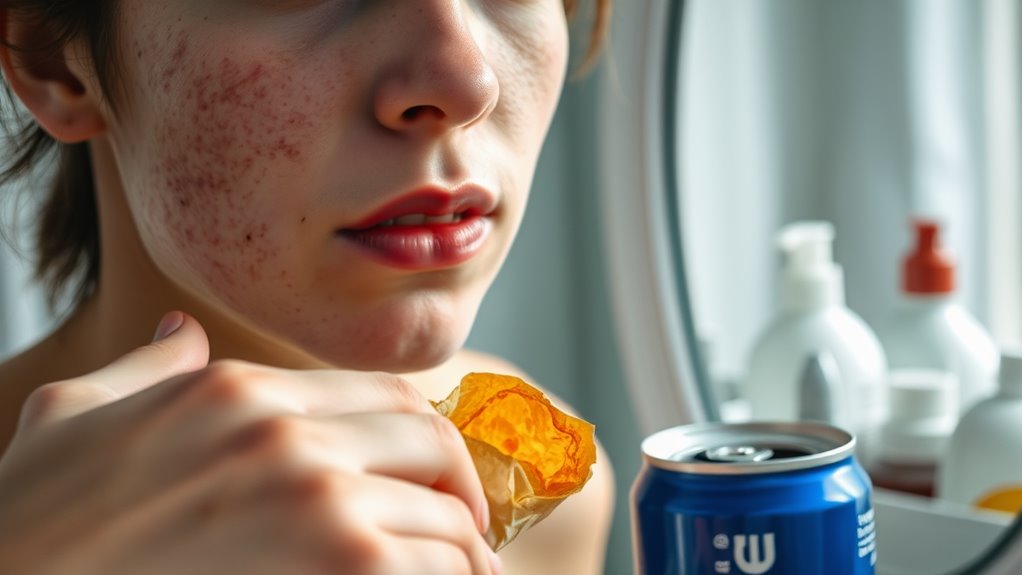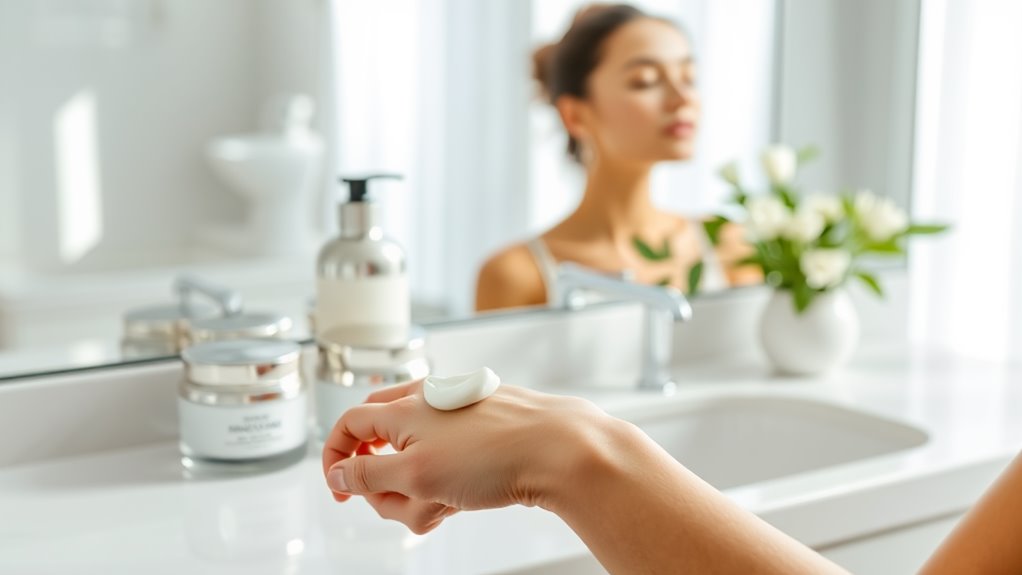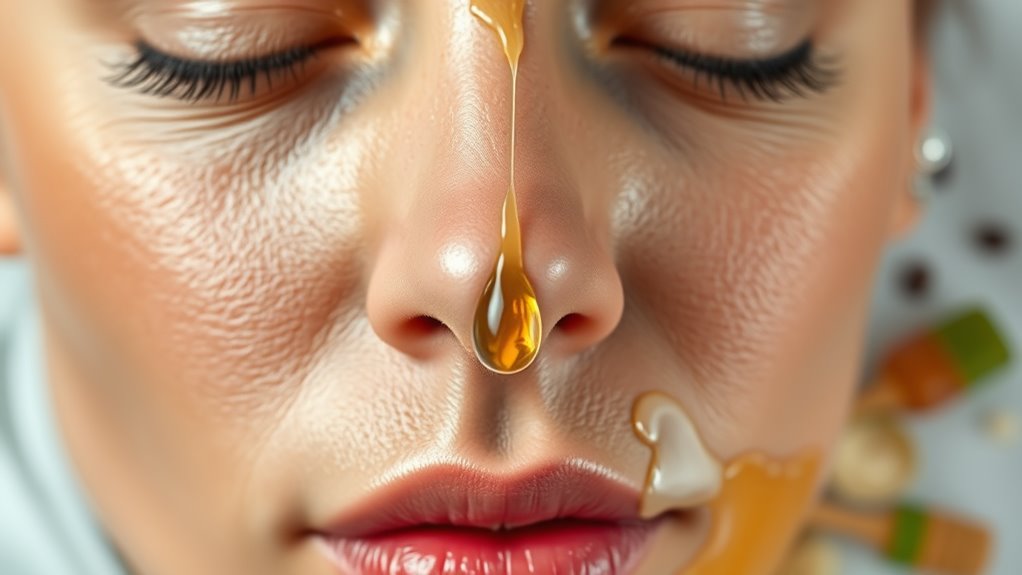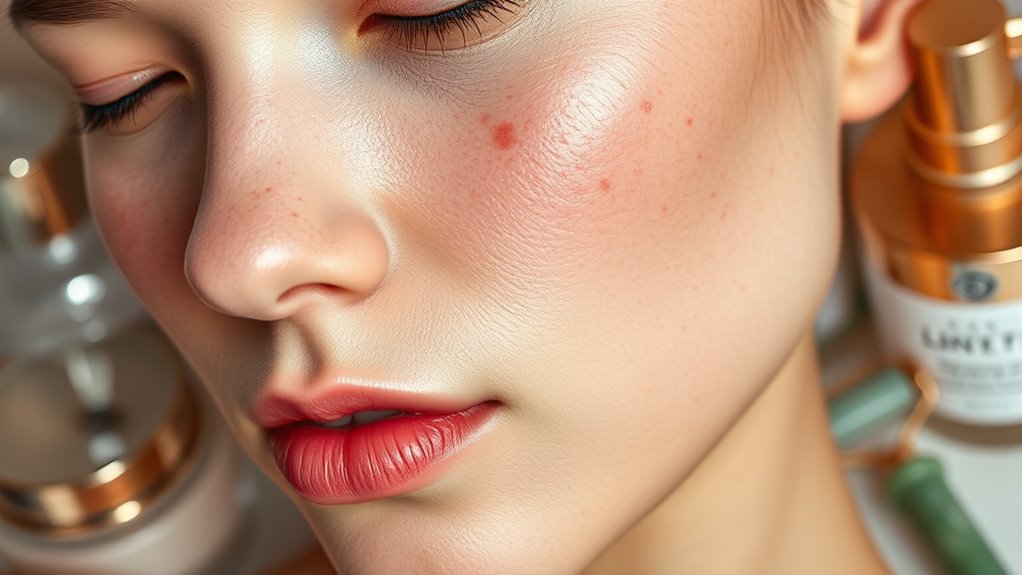These 5 Habits Are Making Your Acne Worse
Neglecting your daily cleanse, overusing skin care products, frequently touching your face, not changing pillowcases regularly, and consuming excessive sugar and dairy can all worsen your acne. Skipping cleanser leads to dirt and bacteria buildup, while overusing products irritates your skin. Touching your face transfers harmful substances, and dirty pillowcases can clog pores. Finally, a diet high in sugar and dairy can increase inflammation. Understanding these habits can help you achieve clearer skin and improve your overall routine.
Key Takeaways
- Skipping daily cleansing allows dirt and bacteria to thrive, worsening acne and clogging pores.
- Overusing skin care products can irritate the skin and disrupt its barrier, leading to increased breakouts.
- Touching your face frequently transfers oils and bacteria, contributing to clogged pores and inflammation.
- Not changing pillowcases regularly results in a buildup of bacteria and oils, provoking acne flare-ups.
- Consuming excessive sugar and dairy can trigger hormonal fluctuations and inflammation, exacerbating acne issues.
Skipping Your Daily Cleanse
When you skip your daily cleanse, you not only miss the chance to remove dirt and excess oil but also allow bacteria to thrive, which can exacerbate acne.
Cleansing your skin effectively is crucial for maintaining its health, as it helps to prevent clogged pores and the growth of acne-causing bacteria. Regularly cleansing your skin reduces inflammation and allows other treatments to penetrate more effectively.
Neglecting this step contributes to acne worsening habits, as your skin becomes a breeding ground for problems. Studies show that a consistent cleansing routine can significantly improve skin clarity and reduce breakouts. Moreover, damaging your skin barrier can lead to increased sensitivity and irritation, further complicating acne management.
To master your skincare, prioritize cleansing twice a day, ensuring you use appropriate products that suit your skin type for maximum efficacy.
Overusing Skin Care Products
Overusing skin care products can be just as detrimental to your skin as neglecting a proper cleansing routine. When you bombard your skin with multiple active ingredients, you risk irritating the epidermis, leading to redness and inflammation.
Ingredients like retinoids, acids, and certain exfoliants can disrupt your skin barrier if applied excessively. This disruption can trigger an increase in oil production, exacerbating acne rather than alleviating it. Moreover, over-exfoliating your skin can lead to barrier damage, which further complicates the healing process.
Additionally, layering products may create a breeding ground for bacteria if not absorbed properly. To master your skin care routine, focus on quality over quantity. Select a few effective products tailored to your skin type, and give your skin time to adjust between applications. Moderation is key for optimal results.
Touching Your Face Frequently
Touching your face frequently can significantly worsen acne by transferring dirt, oil, and bacteria from your hands to your skin.
This action disrupts your skin’s natural barrier, leading to clogged pores and increased inflammation. Research indicates that the average person touches their face over 20 times per hour, often without realizing it. Each touch introduces potential irritants that can exacerbate existing breakouts or initiate new ones. Additionally, dietary choices can also play a role in the severity of your acne, as certain foods may trigger inflammation.
To combat this habit, be mindful of your hands and consider keeping them occupied, whether through fidgeting or using a stress ball. Additionally, practicing good hygiene by washing your hands regularly can minimize the transfer of harmful substances.
Not Changing Pillowcases Regularly
Neglecting to change your pillowcases regularly can significantly contribute to acne flare-ups.
Pillowcases accumulate dirt, oil, dead skin cells, and bacteria over time. When you sleep, your face comes into direct contact with these contaminants, which may clog pores and provoke inflammatory responses.
Research indicates that maintaining clean bedding can reduce the presence of acne-causing bacteria, thereby minimizing the risk of breakouts. Ideally, you should change your pillowcases at least once a week, or more frequently if you have oily skin or acne-prone conditions. Additionally, the choice of pillowcase materials can also impact skin health, as certain fabrics may trap more oils and bacteria than others.
Implementing this simple habit not only enhances skin health but also promotes overall hygiene. By prioritizing clean pillowcases, you actively combat the conditions that exacerbate your acne.
Consuming Excessive Sugar and Dairy
Consuming excessive sugar and dairy can exacerbate acne symptoms significantly. High sugar intake leads to insulin spikes, which can increase sebum production and promote inflammation, both of which are linked to acne development.
Moreover, dairy products, particularly skim milk, have been associated with acne flare-ups due to their hormonal content and potential to stimulate oil glands. Research indicates that the glycemic index of foods affects skin health; foods with a high glycemic index can worsen acne by causing rapid spikes in blood sugar. Additionally, certain foods that are high in sugar and dairy may contribute to inflammation, further complicating acne issues.
To mitigate these effects, consider reducing your consumption of sugary snacks and dairy products. Instead, focus on a balanced diet rich in whole foods, healthy fats, and antioxidants to support clearer skin.




